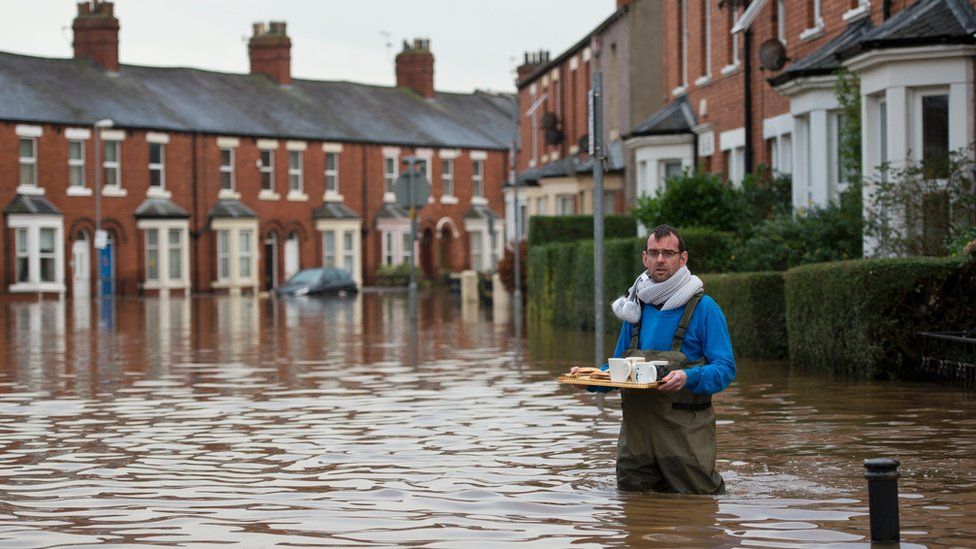Five ways climate change could affect the UK
- Published

Environment Secretary Liz Truss says climate change "potentially" caused the floods affecting England, Scotland and Wales. What other long-term effects might it have potentially on the UK?
Heavier rain
Overall, the government finds "no clear trend" in annual rainfall levels for England and Wales, but notes that summer rainfall has fallen since pre-industrial times, while winter rainfall has increased. It expects these trends to continue - meaning drier summers and wetter winters.
Truss says that "there is potentially a role" for climate change in the flooding affecting large parts of England, Scotland and Wales.
Western Europe is known for its "variable" weather, says Joanna Haigh co-director of the Grantham Institute at Imperial College London. It's not certain what this will mean for storm tracks, conditions setting the direction of travel for storms, she adds. However, warmer air holds more water, meaning that the amount of rain dropped during individual storms could increase, Haigh says.
Hotter weather
The scientific consensus is that global warming is "unequivocal" - and there's "very high confidence" that human activity since the industrial revolution has led to this situation, the UK government says.
In 2009 the state-funded UK Climate Projections report predicted that mean annual temperatures would rise by 2C to 5C by 2080. This was based on a "medium emissions scenario".
The effects would be largest in the UK's southern areas and smallest in northern areas, it added. Hot summers and heat waves would be more common and cold winters rarer.
"It would be difficult to tell from your own day-to-day or year-to-year experience the effects of average temperature change," says Paul Bates, a member of the Royal Society's working group on developing resilience to extreme weather. "The time we will really be able to tell the effects could be in a century from now."
A suggested counter-argument is that, as happened in the last ice age, the Gulf Stream, transporting heat from the Gulf of Mexico to the north Atlantic, will slow down. This would lead to much colder temperatures, as the Gulf Stream is thought to keep UK temperatures 5C higher than they would otherwise be in winter. However, the Royal Society says there are unlikely to be "abrupt changes".
Rising sea levels
The UK Climate Projections of 2009 estimated a sea-level rise of between 13cm and 76cm for the UK by 2095.
The report also suggested the number of "extreme high sea-level events" - caused by storm swells - on the south coast of England could become between 10 and 1,800 times more common by 2100, depending on different scenarios involving emissions. The government acknowledges there's "lively scientific debate" over the issue.
Sea levels don't rise uniformly, says Haigh, and are "hard to predict".
Areas that have been identified as particularly vulnerable to coastal flood risk include South Wales, north-west Scotland, Yorkshire, Lincolnshire, East Anglia and the Thames estuary.
Challenges for the NHS
Increased temperatures will mean a rise in heat-related mortality of 70% by the 2020s, compared with the 2000s, the Health Protection Agency (HPA) projects. This could increase to 540% by the 2080s, it adds. However, this doesn't take into account any precautions brought in to minimise problems, like better health awareness and improved cooling for buildings.
More than 52,000 Europeans died from heat during the summer of 2003, making the heat wave "one of the deadliest climate-related disasters in Western history", according to the Earth Policy Institute. Italy and France accounted for the largest number, but there were 2,139 deaths in England and Wales.
But cold kills people more people than heat in the UK. With winters becoming milder, the level of cold-related mortality is estimated to fall by 2% by the 2050s and 12% by the 2080s, the HPA says.
"What constitutes dangerous levels of heat varies on where you are in the UK," says Bates. "Scotland has a lower threshold for warnings than London, for instance. To a certain extent, populations adapt to conditions."
Another concern is the possible spread of diseases, such as malaria. There could be "sustained transmission" - lasting for one month or more a year - in southern England by 2080, research suggests. But anti-malarial drugs and the UK health system should be able to minimise this, it's added.
The government says climate change is likely to raise food prices. "As healthy food is often more expensive this may reduce the nutritional quality of dietary intakes and hence the nutritional status of some population groups," it adds.
Threats to wildlife
There are warnings that rising temperatures will disrupt UK wildlife. The RSPB says large storms will damage habitat and that, as different species' behaviour gets out of kilter, the balance between predators and their prey will be affected. Species may move northwards to cope, putting habitats under further pressure, it argues.
Hotter summers, with more droughts, could also affect agriculture, says Haigh, making the continued cultivation of some traditional crops more difficult. But Liz Truss's predecessor as Environment Secretary, Caroline Spelman, said in 2012 that there could be an opportunity for farmers to grow peaches, maize and sunflowers.
UN climate conference 30 Nov - 11 Dec 2015
COP 21 - the 21st session of the Conference of the Parties - will see more than 190 nations gather in Paris to discuss a possible new global agreement on climate change, aimed at reducing greenhouse gas emissions to avoid the threat of dangerous warming due to human activities.
Explained: What is climate change?
In video: Why does the Paris conference matter?
Analysis: Latest from BBC environment correspondent Matt McGrath
In graphics: Climate change in six charts
More: BBC News special report (or follow the COP21 tag in the BBC News app)
Subscribe to the BBC News Magazine's email newsletter to get articles sent to your inbox.